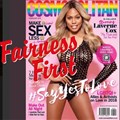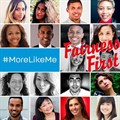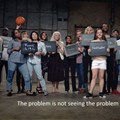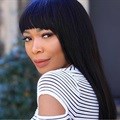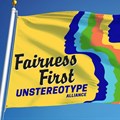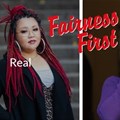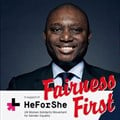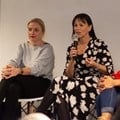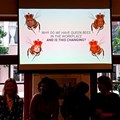#Loeries2019: Our responsibility of better representation in advertising, media

Azania Mosaka chaired the popular panel, saying the latest Dove ad really stirred something inside her as a female and a mother. She shared that she was shy growing up and didn’t socialise much.
She loved sticking posters on her wall but hated the gap in her teeth as she saw perfect smiles in all the posters of stars she admired. Short of surgery and braces, there’s nothing else she could do as she came from a Soweto household supporting three children on a single nursing salary.Not only did she not see people who looked like her in media and advertising, she didn’t see anyone who had made a success of it. While she’s among the poster-children for success today, she counts the likes of gap-toothed Lawrence Fishburne, Eddie Murphy and our own Anele Mdoda as gap-toothed role models today.
That’s why the Dove #ShowUs ad hit home for her, as it’s about the representation of women in all our varieties.
Panellist and Dove ambassador Elle-Rose said Azania’s story hit home in that she didn’t see any trans women growing up.
She feels a campaign like #ShowUs would have helped her feel like there was a place for her in the world if she’d seen it growing up.
The Dove #ShowUs campaign
Khanyi Mpumlwana of FCB represented the advertising industry on the panel and spoke of the need for creatives to foster a culture of accountability.
She acknowledges that it’s hard to convince an entire industry that’s been doing something a certain way for many years to suddenly do things the right way, but we all need to do our bit.From the client-side we heard from Sphelele Mjadu, Unilever Personal Care Senior Public Relations Manager for Africa, who said the #ShowUs campaign is two years in the making.
It comes from the need to understand that the unrealistic beauty stereotypes we portray have a negative impact all round, and a huge level of potential as you can’t be what you can’t see.
Growing up dark-skinned, with bigger hips than most, Mjadu admitted to nicknames like Dollface.
Her family thought this sweet but hearing it made her heart sink as she didn’t see darker and bigger females in the industry.
”A girl like me”: Reclassifying the standard of beauty and success
She went on to attend a multiracial private school where skinny was the norm.
Explaining what that did to her outlook and ability to attain success, Mjadu admits it had a huge impact as she just didn’t view herself as beautiful, which affected her self-confidence and attaining her full potential as she felt she wasn’t ‘the standard’ everyone looked up to.
Mpumlwana shared the stats that if a female CEO tells a joke, it’s 80% less likely to be well-received than if a male told it, even if she’s a brilliant storyteller. The message was hitting home hard for masterclass attendees by now, but there was more to come.
Next to speak was Asanda Sizani, originally from the Eastern Cape, who remembers the first time she bought a magazine with her own money, as there was “a girl like me” on the cover of the international glossy. The image grabbed her and she couldn’t resist.
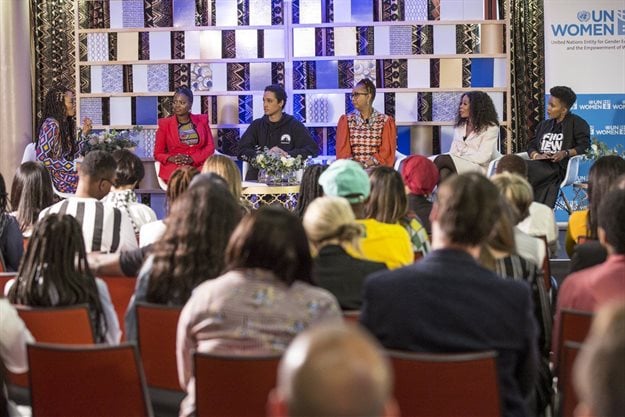
Sizani wanted to create the same feeling when others saw her work, and she wanted to work for that magazine. She went on to become South Africa’s first black fashion editor, first black fashion director, and eventually first black editor-in-chief of Glamour.
These are all relatable stories, but the sad truth is that Dove and Edelman’s recent research found that as much as 71% of women today don’t feel represented. The majority of what they see in the media and advertising are unrealistic.
That’s where UN Women and Dove are trying to change the picture.
They stand for not letting anyone feel they are less than anyone else, or that they should be anything other than their own best self. A lot of that is to do with what’s fed into your self-esteem.
The #Unstereotype Alliance
It’s about setting global standards everywhere. Anne Githuku-Shongwe, representative of UN Women South Africa’s Multi-Country Office, said the gender and feminist movement is about taking big steps forward, regardless of whether the people who control that decision participate.
The Unstereotype Alliance was born as a platform at Cannes Lions in 2017, when UN Women came together with Unilever to challenge stereotypes and welcome the global industry to join the fight to ‘unstereotype’ every image put on the table.
Mjadu adds that only women were involved in creating the #ShowUs campaign, as they could then control their own narrative.
They needed to take ownership of what they wanted to portray, to be represented both behind and in front of the camera.
In doing so, females owned the story and spoke on their own behalf. We saw this in action in the masterclass room, where the film crew included women of colour.
Anne Githuku-Shongwe also spoke of the #HeforShe binary campaign, which aimed to bring men in positions of power in solidarity with women, to champion the cause and ensure parity at every level.
The panel ended by advising attendees to not see this work as a flash in the pan based on the current zeitgeist. But your brand’s work in this space won’t necessarily look like what Dove has done. It’s not a copy-paste job. You need to identify where you can enhance representation.
It’s on creatives to challenge clients before it’s demanded, advocated and marched for by Gen Z, which is particularly demanding of brands with purpose.
We all need to challenge our teams to be consistent in our storytelling. Identify and put an end to the ‘queen bee’ and pull-down syndrome that we speak about in private, but tolerate in the workplace, need to create a safe environment to feel comfortable enough to say you’re nervous or in pain.
As the industry behind the scenes, we need to align with the right alliances and work together to create a more inclusive society.
It’s on industry owners to change the narrative, and highlight the new power of companies coming together and leading society, as well as individuals banding together for a good purpose, to create impact.
Proof that if you see it, you can achieve it.
There’s a free UnStereotype Alliance content playbook to start addressing unconscious biases as a tool for activism and Loeries Creative Week Durban is currently underway, taking place from 22 to 24 August 2019. Keep an eye on the Loeries’ Twitter, Facebook and Instagram feeds and stay tuned for all the latest updates in our Loeries’ special section.



